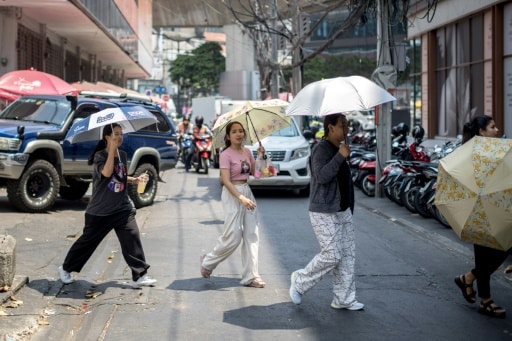New Delhi (AFP) – Climate change has made extreme heatwaves that hit Bangladesh, India, Laos and Thailand in April at least 30 times more likely to occur in those countries, according to an international scientific analysis published on Wednesday.
The study, conducted by 22 international climatologists from World Weather Attribution (WWA), was based on the average maximum temperature and maximum heat index for four consecutive days in April in two regions, one covering South and East India and Bangladesh, and others include all of Thailand and Laos.
“Researchers found that climate change makes such humid heat waves at least 30 times more likely to occur, with temperatures at least 2°C higher than without climate change,” WWA said in a statement.
[À lire aussi Mieux anticiper les canicules et les vagues de chaleur extrême grâce à l’IA et aux statistiques, un enjeu pour le siècle]On April 18, parts of India experienced temperatures above 44 C° which resulted in the death of at least 11 people near Bombay. It was the hottest day in six decades in Dhaka, the capital of Bangladesh.
On April 15, Thailand recorded an all-time heat record of 45.4C in the city of Tak, where two deaths were reported, as the Lao province of Sainyabuli set a national record of 42.9C.
“Until global greenhouse gas emissions stop, global temperatures will continue to increase and such events will become more frequent and severe,” WWA warned.
According to WWA, the recent humid heatwaves, in Laos and Thailand, would have been nearly impossible to have occurred without the effects of climate change, although they are still highly unusual events that only occur once every 200 years or so.
But with a 2°C rise that will occur within thirty years if emissions don’t stop, such episodes will likely occur every 20 or so, WWA underlined.
In Bangladesh and India, such episodes, which used to occur less than once a century, now occur on average every five years. Without emission reductions, they will occur at least once every two years.
“Climate change is dramatically increasing the frequency and intensity of heat waves, one of the deadliest weather events,” said Friederike Otto, senior lecturer in climate science at the Grantham Institute for Climate Change, quoted in the press release.
Scientists are often hesitant to attribute specific phenomena to climate change, but in recent years a field called ‘attributional science’ has emerged, exemplified by the WWA initiative.
Few weather phenomena have more complex causal relationships with global warming, WWA explains, than hot or cold summers, droughts, and extreme rainfall, which are easier to study.
© AFP

“Twitter junkie. Hipster-friendly bacon expert. Beer ninja. Reader. Communicator. Explorer. Passionate alcohol geek.”







